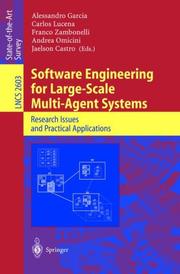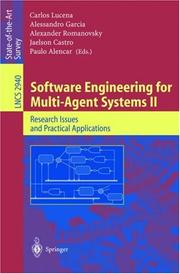| Listing 1 - 2 of 2 |
Sort by
|

ISBN: 3540358285 3540087729 Year: 2003 Publisher: Berlin, Heidelberg : Springer Berlin Heidelberg : Imprint: Springer,
Abstract | Keywords | Export | Availability | Bookmark
 Loading...
Loading...Choose an application
- Reference Manager
- EndNote
- RefWorks (Direct export to RefWorks)
Nowadays, engineering large-scale software systems means dealing with complex systems composed of pervasive software components that move around and adapt to nondeterministic and open environments, like the Internet, in order to achieve systems design goals through the coordination of autonomously distributed services. The agent metaphor, in particular software agents and multi-agent systems (MAS), constitutes a promising approach for covering most of the software development life cycle, from conceptual modeling and requirements specification to architectural definition, design, and implementation. This book presents 17 carefully reviewed papers arranged in order to provide a coherent survey of how to exploit agent properties and MAS issues in today's software systems. The book offers the following topical sections: - software engineering foundations - requirements engineering and software architecture - coordination and mobility - reuse -dependability -empirical studies and applications.
Software engineering --- Intelligent agents (Computer software) --- Computer Science --- Engineering & Applied Sciences --- Software engineering. --- Computer software engineering --- Computer science. --- Computer communication systems. --- Computer programming. --- User interfaces (Computer systems). --- Artificial intelligence. --- Computer Science. --- Artificial Intelligence (incl. Robotics). --- Software Engineering. --- Computer Communication Networks. --- Programming Techniques. --- Information Systems Applications (incl. Internet). --- User Interfaces and Human Computer Interaction. --- Engineering --- AI (Artificial intelligence) --- Artificial thinking --- Electronic brains --- Intellectronics --- Intelligence, Artificial --- Intelligent machines --- Machine intelligence --- Thinking, Artificial --- Bionics --- Cognitive science --- Digital computer simulation --- Electronic data processing --- Logic machines --- Machine theory --- Self-organizing systems --- Simulation methods --- Fifth generation computers --- Neural computers --- Interfaces, User (Computer systems) --- Human-machine systems --- Human-computer interaction --- Computers --- Electronic computer programming --- Electronic digital computers --- Programming (Electronic computers) --- Coding theory --- Communication systems, Computer --- Computer communication systems --- Data networks, Computer --- ECNs (Electronic communication networks) --- Electronic communication networks --- Networks, Computer --- Teleprocessing networks --- Data transmission systems --- Digital communications --- Electronic systems --- Information networks --- Telecommunication --- Cyberinfrastructure --- Network computers --- Informatics --- Science --- Programming --- Distributed processing --- Artificial Intelligence. --- Application software. --- Application computer programs --- Application computer software --- Applications software --- Apps (Computer software) --- Computer software


ISBN: 1280307021 9786610307029 3540246258 3540211829 Year: 2004 Volume: 2940 Publisher: Berlin, Heidelberg : Springer Berlin Heidelberg : Imprint: Springer,
Abstract | Keywords | Export | Availability | Bookmark
 Loading...
Loading...Choose an application
- Reference Manager
- EndNote
- RefWorks (Direct export to RefWorks)
Advances in networking technology have revitalized the investigation of agent technologyasapromisingparadigmforengineeringcomplexdistributedsoftware systems. Agent technology has been applied to a wide range of application - mains, including e-commerce, human-computer interfaces, telecommunications, and software assistants. Multi-agent systems (MASs) and their underlying t- ories provide a more natural support for ensuring important properties such as autonomy, mobility, environment heterogeneity, organization, openness, and intelligence. As a consequence, agent-based systems are likely to provide new - proaches to dealing with the complexity of developing and maintaining modern software. However, developing robust large-scale agent-based systems will - quire new software engineering approaches. There are currently many methods and techniques for working with individual agents or with systems built using only a few agents. Unfortunately, agent-based software engineering is still in its infancy and existing software engineering approaches are unable to cope with large MASs. The complexity associated with a large MAS is considerable. When a huge number of agents interact over heterogeneous environments, various phenomena occur which are not as easy to capture as when only a few agents are working together. As the multiple software agents are highly collaborative and operate in networked environments, they have to be context-aware and deal with - vironment uncertainty. This makes their coordination and management more di?cult and increases the likelihood of exceptional situations, such as security holes, privacy violations, and unexpected global e?ects. Moreover, as users and softwareengineersdelegatemoreautonomytotheirMASs,andputmoretrustin their results, new concerns arise in real-life applications.
Software engineering --- Intelligent agents (Computer software) --- Computer science. --- Computer Communication Networks. --- Software engineering. --- Artificial intelligence. --- Computer Science --- Engineering & Applied Sciences --- Computer communication systems. --- Computer programming. --- User interfaces (Computer systems). --- Computer Science. --- Software Engineering/Programming and Operating Systems. --- Software Engineering. --- Programming Techniques. --- User Interfaces and Human Computer Interaction. --- Artificial Intelligence (incl. Robotics). --- AI (Artificial intelligence) --- Artificial thinking --- Electronic brains --- Intellectronics --- Intelligence, Artificial --- Intelligent machines --- Machine intelligence --- Thinking, Artificial --- Bionics --- Cognitive science --- Digital computer simulation --- Electronic data processing --- Logic machines --- Machine theory --- Self-organizing systems --- Simulation methods --- Fifth generation computers --- Neural computers --- Interfaces, User (Computer systems) --- Human-machine systems --- Human-computer interaction --- Computers --- Electronic computer programming --- Electronic digital computers --- Programming (Electronic computers) --- Coding theory --- Computer software engineering --- Engineering --- Communication systems, Computer --- Computer communication systems --- Data networks, Computer --- ECNs (Electronic communication networks) --- Electronic communication networks --- Networks, Computer --- Teleprocessing networks --- Data transmission systems --- Digital communications --- Electronic systems --- Information networks --- Telecommunication --- Cyberinfrastructure --- Network computers --- Informatics --- Science --- Programming --- Distributed processing --- Artificial Intelligence.
| Listing 1 - 2 of 2 |
Sort by
|

 Search
Search Feedback
Feedback About
About Help
Help News
News